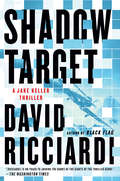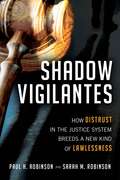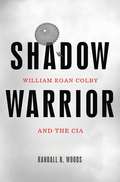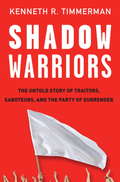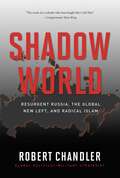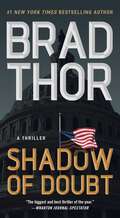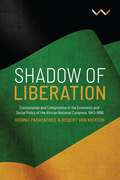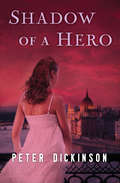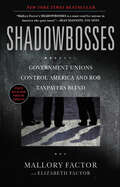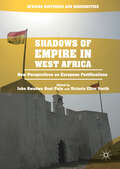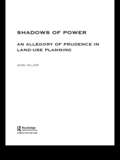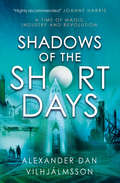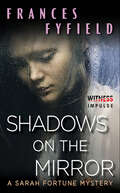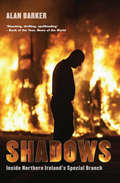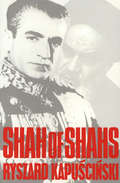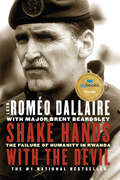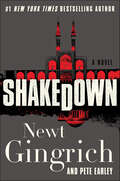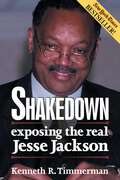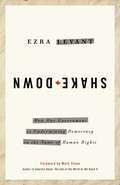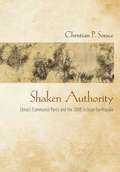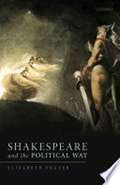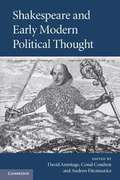- Table View
- List View
Shadow States: India, China and the Himalayas, 1910–1962
by Bérénice Guyot-RéchardSince the mid-twentieth century China and India have entertained a difficult relationship, erupting into open war in 1962. Shadow States is the first book to unpack Sino-Indian tensions from the angle of competitive state-building - through a study of their simultaneous attempts to win the approval and support of the Himalayan people. When China and India tried to expand into the Himalayas in the twentieth century, their lack of strong ties to the region and the absence of an easily enforceable border made their proximity threatening - observing China and India's state-making efforts, local inhabitants were in a position to compare and potentially choose between them. Using rich and original archival research, Bérénice Guyot-Réchard shows how India and China became each other's 'shadow states'. Understanding these recent, competing processes of state formation in the Himalayas is fundamental to understanding the roots of tensions in Sino-Indian relations. Analyses the daily dynamics of China and India's state- and nation-building in Tibet and the Himalayas. Contests standard narratives of the roots of the 1962 Sino-Indian War and India's defeat by China Brings to light the importance of the Himalayan people in China and India's relations. Draws on a variety of unexplored archives, including from Arunachal Pradesh itself.
Shadow Target (A Jake Keller Thriller #4)
by David RicciardiSomeone is assassinating CIA field officers and Jake Keller's name is next on the list in the latest thrilling novel from the author Publishers Weekly calls "a fresh voice in the crowded spy thriller field."Jake doesn't know who is trying to kill him and he doesn't know why. Still, it's a threat he can't ignore. When his small plane crashes in the Alps, Jake is the only survivor. A rescue helicopter soon arrives, but the men inside are not there to save anyone. They are determined to complete the murderous job they started.Jake escapes from the mountainside deathtrap, but it won't be the only attempt on his life. If he's to have any chance at surviving, he'll have to find out who's behind the killings. But the circle of people Jake can trust is distressingly small as he suspects that someone inside the Agency is feeding his every move to the very people who are trying to end his life. Jake's quest takes him to the candle-lit cathedrals of Paris and the rain-slicked streets of London. He makes contact with old friends and new enemies along the way—but his true nemesis may be closer than he imagines.
Shadow Vigilantes: How Distrust In The Justice System Breeds A New Kind Of Lawlessness
by Paul H. Robinson Sarah M. RobinsonA form of subtle vigilantism threatens to undermine the justice system and is eroding community trust in law enforcement.A pervasive and destructive problem is afflicting our current justice system, eroding community confidence in law enforcement. "Shadow vigilantism" is a vicious cycle in which ordinary people, as well as criminal justice officials, are so fed up with the system's failures that they distort and subvert the system to force it to do the justice that it seems reluctant to do on its own. The effects of this lack of trust are pervasive and pernicious: citizens refuse to report a crime or help investigators; jurors refuse to indict or convict; and officials manipulate a system that is perceived to be unreliable. This downward spiral eventually undermines the moral authority of law enforcement and creates widening rifts in the community.This book examines many examples of how the community has responded when the justice system is perceived to fail, including the infamous murder of Emmett Till, which became a cause that spurred on the NAACP and the civil rights movement; the Lavender Panthers, which formed in response to gay bashing during the 1980s; the Crown Heights Maccabees, a neighborhood watch group that successfully reduced neighborhood crime when the police failed to do so; the Animal Liberation Front, which struck back at institutions for perceived abuses to animals; Operation Perverted Justice, an organization that used online chat rooms to out pedophiles by publicizing their personal information; and many others.Such examples highlight the importance of upholding a justice system that works to provide justice for all and is not perceived to condone legal technicalities that overturn just punishment, judicial rules that suppress evidence and let serious offenders go, and other actions that undermine public trust in the system.
Shadow Warrior: William Egan Colby and the CIA
by Randall B. WoodsWorld War II commando, Cold War spy, and CIA director under presidents Nixon and Ford, William Egan Colby played a critical role in some of the most pivotal events of the twentieth century. A quintessential member of the greatest generation, Colby embodied the moral and strategic ambiguities of the postwar world, and first confronted many of the dilemmas about power and secrecy that America still grapples with today. In "Shadow Warrior," eminent historian Randall B. Woods presents a riveting biography of Colby, revealing that this crusader for global democracy was also drawn to the darker side of American power. Aiming to help reverse the spread of totalitarianism in Europe and Asia, Colby joined the U. S. Army in 1941, just as America entered World War II. He served with distinction in France and Norway, and at the end of the war transitioned into AmericaOCOs first peacetime intelligence agency: the CIA. Fresh from the fight against fascism, Colby zealously redirected his efforts against international communism. He insisted on the importance of fighting communism on the ground, doggedly applying guerilla tactics for counterinsurgency, sabotage, surveillance, and information-gathering on the new battlefields of the Cold War. Over time, these strategies became increasingly ruthless; as head of the CIAOCOs Far East Division, Colby oversaw an endless succession of assassination attempts, coups, secret wars in Laos and Cambodia, and the Phoenix Program, in which 20,000 civilian supporters of the Vietcong were killed. Colby ultimately came clean about many of the CIAOCOs illegal activities, making public a set of internal reportsuknown as the ofamily jewelsOCOuthat haunt the agency to this day. Ostracized from the intelligence community, he died under suspicious circumstancesua murky ending to a life lived in the shadows. Drawing on multiple new sources, including interviews with members of ColbyOCOs family, Woods has crafted a gripping biography of one of the most fascinating and controversial figures of the twentieth century.
Shadow Warriors: The Untold Story of Traitors, Saboteurs, and the Party of Surrender
by Kenneth R. TimmermanTimmerman contends that partisan bureaucrats at the State Department, the CIA, and other key agencies, together with Democratic politicians, are actively undermining the Bush administration policy at every turn, thus gutting America's ability to fight the War on Terror.
Shadow World: Resurgent Russia, the Global New Left, and Radical Islam
by Robert ChandlerTHE SECRET WAR AGAINST AMERICAAmerica is at war and the stakes are huge. The fight is not just in Iraq and Afghanistan, it is a global contest between the United States, radical Islam, a resurgent Russia, and a virulent New Left that is coming to power in Latin America and stalking the corridors of power around the world, including the United States. These three enemies of America are separate but they cooperate--and in his stunning new book, Shadow World, Robert Chandler shows how. In Shadow World you'll learn:* Why "post-Communist" Russia is not really "post-Communist" at all, but represents an insidious new strategic threat to the United States* How "cultural communism" has rejuvenated the radical Left's prospects around the world* Why American-style democracy is losing out to Castro and Hugo Chavez-style communism in Latin America* How radical Islam has allied itself to the New Left--and why this makes radical Islam even more dangerous than beforeShadow World reveals, in a way no other book has done, the new strategic realities of the post-Cold War, post-9/11 world. Provocative, insightful, thorough, it is essential reading for those who want to see the 21st century as America's century, and not the century of her enemies.
Shadow of Doubt: A Thriller (The Scot Harvath Series #23)
by Brad ThorIn a world shrouded in shadows, where doubt is the only weapon, can one spy expose the truth? #1 New York Times and #1 Wall Street Journal bestselling author Brad Thor delivers his latest high-octane thriller.A mysterious cargo plane, flanked by a squadron of Russia&’s most lethal fighters, has just taken off from a remote airbase. Closely monitored by the United States, no one inside the Pentagon has any idea where it&’s going or what it&’s carrying. A high-level Russian defector, a walking vault of secrets that could shatter the West, seeks asylum in Norway. Across the continent, in the heart of Paris, a lone French agent stumbles upon a conspiracy so explosive it could ignite a global firestorm. As alarm bells ring in Washington, America&’s top spy, Scot Harvath, is forced to choose between his conscience and his country. You&’ll be left breathless as Harvath is swept into a whirlwind of double agents, international intrigue, and heart-stopping chases.
Shadow of Liberation: Contestation and Compromise in the Economic and Social Policy of the African National Congress, 1943-1996
by Vishnu Padayachee Robert Van NiekerkShadow of Liberation explores the intricate twists, turns, contestations and compromises of ANC economic and social policymaking with a focus on the transition era of the 1990’s and the early years of democracyWith the damning revelations by the Zondo Commission of Inquiry into State Capture on the massive corruption of the South African body politic, the timing of this book could not be more relevant. South Africans need to confront the economic and social policy choices that the liberation movement made and to see how these decisions may have facilitated the conditions for corruption to emerge and flourish. Answers are needed. Padayachee and van Niekerk focus their attention on the primary question of how and why the ANC, given its historical anti-inequality, re-distributive stance, come in the 1990s, to such a dramatic turn around and move towards an essentially market-dominated approach. Were they pushed or did they go willingly? What role if any did Western governments and international financial institutions play? And what of the role of the late apartheid state and South African business? Did leaders and comrades ‘sell out’ the ANC’s emancipatory policy vision? Shadow of Liberation tries to provide answers to these questions drawing on the best available primary archival evidence as well as extensive interviews with key protagonists across the political, non-government and business spectrum. The authors argue that the ANC’s emancipatory policy agenda was broadly to establish a social democratic welfare state upholding rights of social citizenship. However its economic policy framework to realise this emancipatory mission was either non-existent or egregiously misguided.
Shadow of a Hero
by Peter DickinsonTo save a country, a girl and her grandfather must learn what it means to be a hero The greatest hero in the history of Varina was baptized in a cave. Every schoolchild knows the story. His parents were on their way to the city when a storm drove them to take shelter in the mountainside, along with a priest, a bandit, and a scholar. When the storm did not abate, they asked the priest to give their child a name, and he christened the boy Restaur Vax. The boy would grow to be a warrior, a scholar, and a man of god, and his name would lead an oppressed people to independence for the first time. Alas, that liberty would not survive. Generations later, Vax’s oldest living descendant is in London, teaching the language of Varina to his inquisitive young granddaughter. When his homeland is torn apart once more by war, calls come for this man to take up the mantle of the Vax name—and become a hero for a new age. This ebook features an illustrated personal history of Peter Dickinson including rare images from the author’s collection.
Shadow of a Hero
by Peter DickinsonTo save a country, a girl and her grandfather must learn what it means to be a hero The greatest hero in the history of Varina was baptized in a cave. Every schoolchild knows the story. His parents were on their way to the city when a storm drove them to take shelter in the mountainside, along with a priest, a bandit, and a scholar. When the storm did not abate, they asked the priest to give their child a name, and he christened the boy Restaur Vax. The boy would grow to be a warrior, a scholar, and a man of god, and his name would lead an oppressed people to independence for the first time. Alas, that liberty would not survive. Generations later, Vax&’s oldest living descendant is in London, teaching the language of Varina to his inquisitive young granddaughter. When his homeland is torn apart once more by war, calls come for this man to take up the mantle of the Vax name—and become a hero for a new age. This ebook features an illustrated personal history of Peter Dickinson including rare images from the author&’s collection.
Shadowbosses: Government Unions Control America and Rob Taxpayers Blind
by Elizabeth Factor Mallory FactorSHADOWBOSSES reads like an organized crime novel, but it's actually a true story of how labor unions are infiltrating our government and corrupting our political process. This compelling and insightful book exposes how unions have organized federal, state, and local government employees without their consent, and how government employee unions are now a threat to our workers' freedoms, our free and fair elections, and even our American way of life. And, Mallory Factor reveals what's coming next: how unions are targeting millions of Americans--maybe even you--for forced unionization so that unions can collect billions more in forced dues and exert an even greater influence over American politics. A chilling expose, SHADOWBOSSES is also a call to citizen action against those who really hold power in America today.
Shadows of Empire in West Africa
by John Kwadwo Osei-Tutu Victoria Ellen SmithThe authors collectively see fortifications as nodes within entangled spaces in West Africa where different peoples interacted, negotiated, and transformed each other socially, politically, culturally, and economically. This multi-discipline collection presents a nuanced image of fortifications, showing that over time the functions and impacts of the buildings changed as the motives, missions, allegiances, and power dynamics in the region also changed. With their focus on the fortifications of Ghana, the authors engage in new scholarly discussion of how these structures may be interpreted in connecting Ghanaian and West African histories to a multitude of global histories. They also enable greater understanding of the fortifications' contemporary use as heritage sites where the Afro-European experience is narrated through guided tours and museums.
Shadows of Power: An Allegory of Prudence in Land-Use Planning (RTPI Library Series)
by Jean HillierShadows of Power examines public policy and in particular, the communicative processes of policy and decision-making. It explore the important who, how and why issues of policy decisions. Who really takes the decisions? How are they arrived at and why were such processes used? What relations of power may be revealed between the various participants?Using stories from planning practices, this book shows that local planning decisions, particularly those which involve consideration of issues of 'public space' cannot be understood separately from the socially constructed, subjective territorial identities, meanings and values of the local people and the planners concerned. Nor can it be fully represented as a linear planning process concentrating on traditional planning policy-making and decision-making ideas of survey analysis-plan or officer recommendation-council decision-implementation. Such notions assume that policy-and decision-making proceed in a relatively technocratic and value neutral, unidirectional, step-wise process towards a finite end point. In this book Jean Hiller explores ways in which different values and mind-sets may affect planning outcomes and relate to systemic power structures. By unpacking these and bring them together as influences on participants' communication, she reveals influences at work in decision-making processes that were previously invisible.If planning theory is to be of real use to practitioners, it needs to address practice as it is actually encountered in the worlds of planning officers and elected representatives. Hillier shed light on the shadows so that practitioners may be better able to understand the circumstances in which they find themselves and act more effectively in what is in reality a messy, highly politicised decision-making process.
Shadows of the Short Days
by Alexander dan VilhjálmssonFor fans of China Mieville and Neil Gaiman. A tale of revolution in a Reykjavik fuelled by industrialised magic, populated by humans, dimensional exiles, otherworldly creatures, psychoactive graffiti and demonic familiars.A tale of revolution in a Reykjavik fuelled by industrialised magic, populated by humans, dimensional exiles, otherworldly creatures, psychoactive graffiti and demonic familiars. HERE LIES A CITY...FUELLED BY INDUSTRIALISED MAGIC.RULED BY A DESPOTIC CROWN.DEMANDING REVOLUTION.WELCOME TO REYKJAVIKRebels and revolutionaries disappear into the infamous prison, the Nine, never to be heard from again. Masked police roam the streets, dark magic lurks in the shadows, and the implacable flying fortress casts its baleful eye over all below.Sæmundur, addict and sorcerer, has been cast out from university, and forbidden to study magic. Dissident artist, Garún, is desperate for a just society and will do anything to achieve it.Both seek revolution in their own ways. Both seek power.Together, they will change Reykjavik forever.
Shadows on the Mirror (The Sarah Fortune Mysteries)
by Frances FyfieldThis searing thriller is perfect for fans of Carol O’Connell and Louise Penny.Sarah Fortune is bored to death—but few know, and fewer would guess, how the beautiful and successful lawyer escapes the stultifying tedium of her career. Since the death of her unfaithful husband, she has been moonlighting as a generous mistress, offering intimate company to lonely men.Sarah is satisfied with her routine. But then she meets Charles Tysall, an important figure at her firm, whose charisma and enormous wealth conceal an implacable will and a misogynist’s mad aggression. Soon Sarah finds herself implicated in a murder when a decaying body is found off the coast. Inexorably, Sarah is hurtling toward a confrontation where there will be no escape from the shadows, no turning from the face of lethal obsession …
Shadows: Inside Northern Ireland's Special Branch
by Alan BarkerIn the early hours of 30 April 2003, twelve armed and uniformed officers accompanied by four plain-clothes detectives burst into Alan Barker's house. They stayed for hours, turning over rooms, seizing documents, impounding computers, files and anything else that interested them. The family were treated as terrorist suspects, the operation resembling so many others in Northern Ireland during the Troubles. But Alan Barker was and is no terrorist. In fact, he has spent his adult life fighting terrorism on the streets of his native province. Barker belonged to the Special Branch, the RUC's elite unit dedicated to fighting the IRA, the INLA and loyalist terrorists. He gives a gripping insider's account of life on the frontline and demonstrates how the RUC used sophisticated listening devices and informants, including the notorious supergrass Raymond Gilmour, in their fight to gain the upper hand. After nearly 30 years of loyal service, Barker retired angry and disillusioned about what he views as the government's capitulation to the terrorists. This is the book that Downing Street and the Northern Ireland Office don't want you to read. It is a story of courage under fire, guile, Le Carré-esque plots and treachery.
Shah of Shahs
by Ryszard KapuscinskiThis journalist&’s portrait of life in Iran just after the Revolution is &“a book of great economy and power [with] a supreme sense of the absurd&” (New Republic). Iran, 1980: the revolutionaries have taken charge. In a deserted Teheran hotel, Ryszard Kapuściński tries to make journalistic and human sense out of the mass of notes, tapes, and photographs he had accumulated during his extended stay in Iran. Just what happened and how? What did Khomeini have to offer that the Shah, who promised to &“create a second America within a generation,&” did not? Where did the revolution come from, and where is it going? After all this blood has been spilled, what has it given its people or the world? &“We have given [the world] poetry, the miniature, and carpets,&” says a rug merchant in Teheran. &“We have given the world this miraculous, Unique uselessness.&” Kapuściński tells a rich story that combines factual reporting with his own impressions and reflections. Always engrossing and frequently revelatory, it is a unique portrait of the psychological state of a country in revolution.
Shake Hands With the Devil: The Failure of Humanity in Rwanda
by Romeo DallaireOn the tenth anniversary of the date that UN peacekeepers landed in Rwanda, Random House Canada is proud to publish the unforgettable first-hand account of the genocide by the man who led the UN mission. Digging deep into shattering memories, General Dallaire has written a powerful story of betrayal, naïveté, racism and international politics. His message is simple and undeniable: “Never again.”When Lt-Gen. Roméo Dallaire received the call to serve as force commander of the UN intervention in Rwanda in 1993, he thought he was heading off on a modest and straightforward peacekeeping mission. Thirteen months later he flew home from Africa, broken, disillusioned and suicidal, having witnessed the slaughter of 800,000 Rwandans in only a hundred days. In Shake Hands with the Devil, he takes the reader with him on a return voyage into the hell of Rwanda, vividly recreating the events the international community turned its back on. This book is an unsparing eyewitness account of the failure by humanity to stop the genocide, despite timely warnings.Woven through the story of this disastrous mission is Dallaire’s own journey from confident Cold Warrior, to devastated UN commander, to retired general engaged in a painful struggle to find a measure of peace, reconciliation and hope. This book is General Dallaire’s personal account of his conversion from a man certain of his worth and secure in his assumptions to a man conscious of his own weaknesses and failures and critical of the institutions he’d relied on. It might not sit easily with standard ideas of military leadership, but understanding what happened to General Dallaire and his mission to Rwanda is crucial to understanding the moral minefields our peacekeepers are forced to negotiate when we ask them to step into the world’s dirty wars.Excerpt from Shake Hands with the DevilMy story is not a strictly military account nor a clinical, academic study of the breakdown of Rwanda. It is not a simplistic indictment of the many failures of the UN as a force for peace in the world. It is not a story of heroes and villains, although such a work could easily be written. This book is a cri de coeur for the slaughtered thousands, a tribute to the souls hacked apart by machetes because of their supposed difference from those who sought to hang on to power. . . . This book is the account of a few humans who were entrusted with the role of helping others taste the fruits of peace. Instead, we watched as the devil took control of paradise on earth and fed on the blood of the people we were supposed to protect.From the Hardcover edition.
Shakedown: A Novel (Mayberry and Garrett #2)
by Newt Gingrich Pete EarleyMayberry and Garrett, introduced in the national bestseller Collusion, are caught in the middle of a deadly crisis with a pending nuclear bomb attack and little help from the government that sidelined them both.When an exiled Iranian scientist is assassinated in Washington, DC, the former FBI counterintelligence agent and ex-SEAL are pulled back into the world of clandestine ops—and the fate of the entire East Coast is at stake. Joining ranks with a heralded Mossad agent, Mayberry and Garrett pursue a skilled international killer hired to murder a legendary Israeli spymaster. Their pursuit draws them into an international conspiracy led by a power-hungry Russian oligarch intent on destroying Washington, DC, and the Navy’s most important Atlantic base. The oligarch plots to unleash a nuclear onslaught first devised by the KGB but shelved by Kremlin leaders during the Cold War. On top of this, Iran’s sudden offer to help the United States raises suspicions about its possible role in a global shakedown. With too many enemies emerging and too little time, the two Americans are forced to operate outside official channels to stay ahead of naive US politicians and foreign enemies out to entangle their efforts in red tape. Operating in an international tinderbox, Mayberry and Garrett must decipher which players are allies and which are posers—in time to thwart a cataclysmic nuclear attack on US soil and prevent an international incident that could ignite a third world war. And they must keep themselves alive.
Shakedown: Exposing the Real Jesse Jackson
by Kenneth R. TimmermanFew political figures in America today arouse as much passion as the Reverend Jesse Jackson. A hero to some in the black community, Jackson is credited with helping to break down barriers to political and economic access. But to other black leaders, Jackson has become a symbol for all that has gone wrong with their community. "Jesse virtually invented black racism," the Reverend Johnny Hunter, a black pastor from Virginia Beach, tells me. The Reverend Jesse Lee Peterson, a black conservative, calls Jackson a "gatekeeper of black progress" and a "race hustler"1 who has cashed in on white guilt to fund an opulent lifestyle and a personal power base. "He is really just a David Duke in black skin," Peterson says.
Shakedown: How Our Government is Undermining Democracy in the Name of Human Rights
by Ezra LevantPart memoir, part investigative journalism, this is a shocking and controversial look at the corruption of Canada's human rights commissions."On January 11, 2008, I was summoned to a 90-minute government interrogation. My crime? As the publisher of Western Standard magazine, I had reprinted the Danish cartoons of Mohammed to illustrate a news story. I was charged with the offence of "discrimination," and made to appear before Alberta's "human rights commission" for questioning. As crazy as it sounds, I became the only person in the world to face legal sanction for printing those cartoons."As a result of this highly publicized event, Ezra Levant began investigating other instances in which innocent people have had their freedoms compromised by bureaucrats presuming to protect Canadians' human rights. He discovered some disturbing and even bizarre cases, such as the tribunal ruling that an employee at a McDonald's restaurant in Vancouver did not have to wash her hands at work. And the human rights complaint filed by a Calgary hair stylist against the women at a salon school who called him a "loser." In another case that seemed stranger than fiction, an emotionally unstable transvestite fought for -- and won -- the right to counsel female rape victims, despite the anguished pleas of those same traumatized victims. Human rights commissions now monitor political opinions, fine people for expressing politically incorrect viewpoints, censor websites, and even ban people, permanently, from saying certain things. The book is a result of Levant's ordeal and the research it inspired. It shows how our concept of human rights has morphed into something dangerous and drastically different from its original meaning. Shakedown is a convincing plea to Canadians to reclaim their basic liberties.From the Hardcover edition.
Shaken Authority: China's Communist Party and the 2008 Sichuan Earthquake
by Christian P. SoraceIn Shaken Authority, Christian P. Sorace examines the political mechanisms at work in the aftermath of the 2008 Sichuan earthquake and the broader ideological energies that drove them. Sorace takes Communist Party ideas and discourse as central to how that organization formulates policies, defines legitimacy, and exerts its power. Sorace argues that the Communist Party has never abandoned its conviction that discourse can shape the world and the people who inhabit it. Sorace also demonstrates how the Communist Party’s planning apparatus continues to play a crucial role in engineering China’s economy and market construction, especially in the countryside. Sorace takes a distinctive and original interpretive approach to understanding Chinese politics, and Shaken Authority demonstrates how Communist Party discourse and ideology influenced the official decisions and responses to the Sichuan earthquake. Sorace provides a clear view of the lived outcomes of Communist Party plans, rationalities, and discourses in the earthquake zone. The three case studies he presents each demonstrate a different type of reconstruction and model of development: urban-rural integration, tourism, and ecological civilization. Sorace’s work emphasizes the need for a grounded literacy in the political concepts, discourses, and vocabularies of the Communist Party itself. To dismiss China’s official discourse as "empty propaganda," Sorace argues, makes China and Chinese realities harder to understand, not easier.
Shakespeare And The Political Way
by Elizabeth FrazerStudies of Shakespeare and politics often ask the question whether his dramas are on the side of aristocratic or monarchical sovereign authority, or are on the side of those who resist; whether he endorses a standard view of male and patriarchal authority, or whether his cross-dressing heroines put him among feminist thinkers. Scholars also show that Shakespeare's representations of rule, revolt, and arguments about laws and constitutions draw on and allude to stories and real events that were contemporaneous for him, as well as historical ones. <p><p> Building on scholarship about Shakespeare and politics, this book argues that Shakespeare's representations and stagings of political power, sovereignty, resistance, and controversy are more complex. The merits of political life, as opposed to life governed by monetary exchange, religious truth, supernatural power, military heroism, or interpersonal love, are rehearsed in the plots. And the clashing and contradictory meanings of politics -- its association with free truthful speech but also with dishonest hypocrisy, with open action and argument as much as occult behind the scenes manoevring -- are dramatized by him, to show that although violence, lies, and authoritarianism do often win out in the world there is another kind of politics, and a political way that we would do well to follow when we can. The book offers original readings of the characters and plots of Shakespeare's dramas in order to illustrate the subtlety of his pictures of political power, how it works, and what is wrong and right with it.
Shakespeare and Early Modern Political Thought
by David Armitage Conal Condren Andrew FitzmauriceThis is the first collaborative volume to place Shakespeare's works within the landscape of early modern political thought. Until recently, literary scholars have not generally treated Shakespeare as a participant in the political thought of his time, unlike his contemporaries Ben Jonson, Edmund Spenser and Philip Sidney. At the same time, historians of political thought have rarely turned their attention to major works of poetry and drama. A distinguished international and interdisciplinary team of contributors examines the full range of Shakespeare's writings in order to challenge conventional interpretations of plays central to the canon, such as Hamlet; open up novel perspectives on works rarely considered to be political, such as the Sonnets; and focus on those that have been largely neglected, such as The Merry Wives of Windsor. The result is a coherent and challenging portrait of Shakespeare's distinctive engagement with the characteristic questions of early modern political thought.

